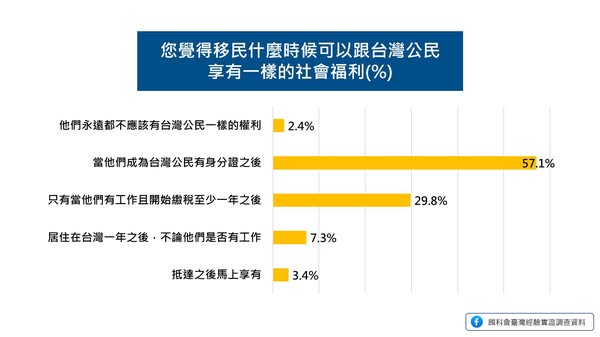Exploring Whether Welfare Chauvinism Can Explain Taiwanese Public Attitudes Toward Immigrant Welfare
With the development of globalization, international population mobility has drawn increasing attention, and controversies over immigrant welfare have also grown. Residents living in areas with larger immigrant populations and higher levels of government social welfare spending 🏠 show stronger negative effects of anti-immigrant sentiment on their support for social welfare policies (Burgoon & Rooduijn, 2020).
Welfare chauvinism refers to the phenomenon in which people oppose or restrict immigrants’ access to welfare in order to preserve benefits for “their own group.” Huang Fang-yi and Yeh Chung-yang (2024) used data from the Taiwan Social Change Survey (TSCS), Globalization and Culture Module, Wave 7, Round 4, focusing on the question: “When do you think people who immigrate to Taiwan from abroad should be able to enjoy the same rights to social welfare and services as Taiwanese citizens (variable f9)?” to explore whether welfare chauvinism can explain Taiwanese public attitudes toward immigrant welfare.

Research findings show:
📈 As many as 59.5% of Taiwanese believe that regardless of employment status, immigrants should only be entitled to the same social welfare and services after becoming Taiwanese citizens.
📈 There is no significant relationship between unemployment risk and welfare chauvinism. However, those who support strict restrictions on economic openness and marriage immigration exhibit higher levels of welfare chauvinism.
In other words, in Taiwan, the factors influencing welfare chauvinism are not economic pressures 💸 but rather individual political views. When people migrate—voluntarily or involuntarily—they expect the host government to protect their basic human rights. Yet for welfare policies to be implemented, they must also gain public support. National exclusivity plays a crucial role in the tension between the ideals of “free migration” and the “welfare state.” Must these two be mutually exclusive, or can we find a win–win solution?
📁 Curious about other Taiwanese perspectives on immigration issues? Click the link in the comments 🔗 to explore more data from the Taiwan Social Change Survey (TSCS).
Original links:The Progressive's Dilemma: An Empirical Study of Welfare Chauvinism in Taiwan

